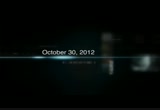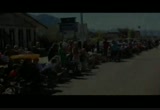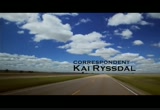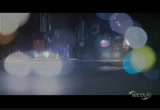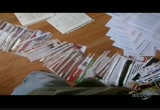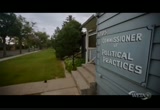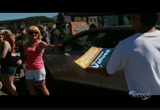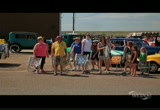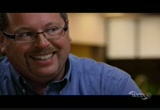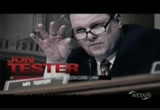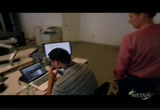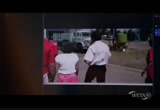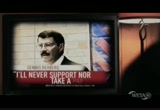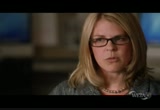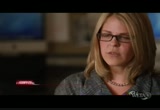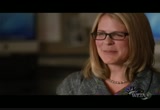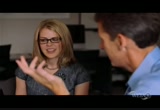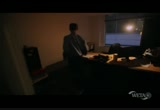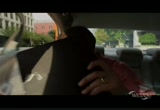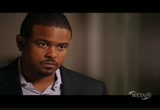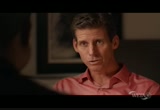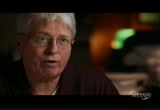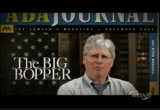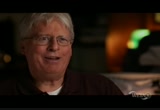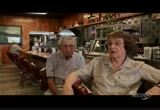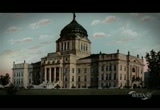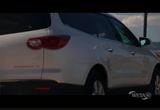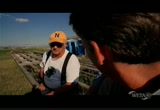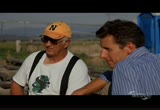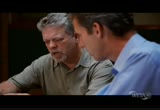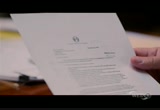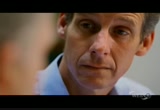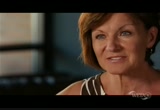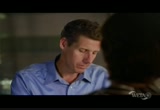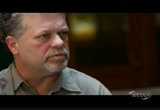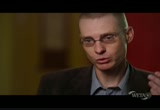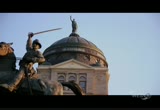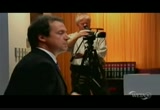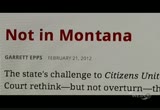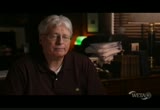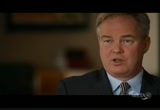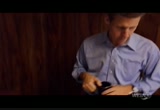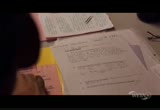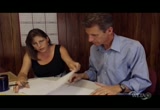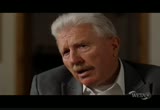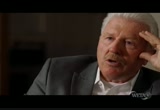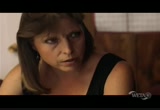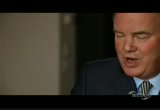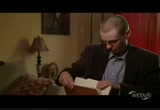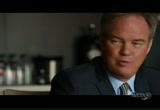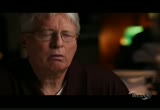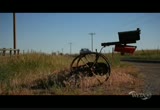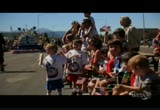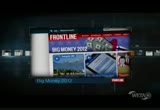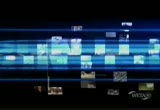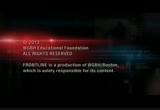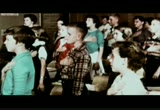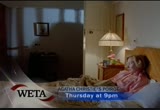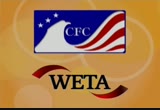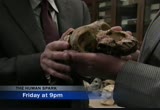tv Frontline PBS November 1, 2012 3:00am-4:00am EDT
3:00 am
>> tonight ofrontline, montana, the surprising battleground over campaign finance. >> somebody is buying the state out. >> more ads, more spending, more negativity. >> we're not seeing where the money's coming from. >> look who's controlling the message: it's these outside groups. >> in collaboration with american public media's marketplace, frontline investigates money and politics with the groundbreaking "big money 2012" initiative. >> the supreme court put elections in the hands of corporations and big money. >> it doesn't corrupt the process; it's necessary for the process. >> what does that say about democracy, though? >> it says that this is completely irrelevant information that only some left-wing nut jobs care about. >> marketplace's kai ryssdal uncovers startling new evidence of outside interest groups' influence on campaigns.
3:01 am
>> i found these buckets of documents. >> we have boxes and folders full of candidate signatures being faxed to western tradition partnership. >> i'm literally not going to comment on them. >> i would say we had grounds to proceed with an investigation and put people under oath. >> how secret big money is changing american politics state by state. tonight frontline, "big sky, big money." >> frontlinis made possible by contributions to your pbs station from viewers like you. thank you. and by the corporation for public broadcasting. major funding is provided by the john d. and catherine t. macarthur foundation, committed to building a more just, verdant, and peaceful world. additional funding is provided by the park foundation, dedicated to heightening public awareness of critical issues. and by the frontline journalism
3:02 am
fund, with a grant from the orfalea foundation. >> it's time to send a message to washington: stop spending money we don't have. how can we afford this tax? ...big corporations and the richest two percent. >> what's at stake is the future of america. >> it costs us, and taxes us, too much. >> american future fund is responsible for the content of this advertising. >> ryssdal: i knew right away this wasn't going to be the usual story on campaign finance. one of the first surprises was finding myself driving the dark streets of denver with attorney alan schwartz, who shared kind of a strange experience. >> it was early january of 2011, and my wife, who had just been reelected to the colorado state
3:03 am
senate, got an e-mail from someone who claimed to have some information about a group that had sent out some attack ads against my wife. >> ryssdal: the guy said he had some documents, and a week later... >> i heard from this individual again. still not identifying himself, but telling me that if i wanted to see the documents, then i needed to get them that day. >> ryssdal: had to be that day. >> had to be that day. >> ryssdal: schwartz agreed to meet the guy who said the documents were stashed in a safe house that he would take him to. >> i didn't know where were going. for the half-hour that we drove from denver to littleton, he told me his story. >> mark it. >> ryssdal: mark seibel. seibel, right? >> seibel, yes. >> basically... >> ryssdal: the man with the documents was mark seibel, a convicted felon who'd spent most of his life living on the streets. one night while staying at a known drug house near denver... >> i found these buckets of
3:04 am
documents. >> ryssdal: documents, he says, a friend found in a stolen car. >> i found pages and pages of like a particular politician's name, like, you know, would be yswritten, you know, like 20 tis on a piece of paper and there was, like, tn there'd be one e'th was cut out and an arrow pointing to it and it would say "use this one." you know, a lot of cut and paste things going on. i took pictures of all theth ils erlaid out.id oktoictututus, kind of grouped things into categories. somebody had transported them from montana to here and it was p.o. box to p.o. box. there was just something wasn't right about it. >> it was a very weird story that mark was telling me. everything about it was odd and peculiar. >> ryssdal: so this is the house? >> this is the house. the gentleman who was living here who was keeping the documents opened the door. he was blind. he reaches out, though, and
3:05 am
grabs me by the arm and he pulls me into the house. and i immediately see that there are several boxes, four or five very large containers on the floor. i could tell that law enforcement would find them very important and interesting and i was determined to get them in the right place as quickly as i could. >> ryssdal: the boxes did turn out to be both interesting and important. and they eventually ended up in the right place. here, with the commissioner of political practices, in helena, montana. but that's a story-- of secrets and money and politics-- that we'll come back to. first, i need to tell you what's been going on in montana's elections. i got to butte on the fourth of july. on the surface, there was the usual hoopla and fanfare. marching bands, flag twirlers,
3:06 am
shriners, mermaids and, of course, politicians of every stripe. >> butte's candidate right here. >> re-elect pat noonan. he's my son. >> ryssdal: but there's something different about this year's campaign. there are new hidden forces at work. nowhere is this more evident than in a barnburner of a race that may well decide which party controls the u.s. senate. with the stakes so high, this race is attracting big money from lots of outside groups. the incumbent fighting to hold onto his seat is democrat jon tester. and he says he's not happy about all this outside money. >> we're going to see a ton of money spent in montana. we're seeing money earlier, more of it, and with more regularity. and i think we're in the process right now of building a campaign infrastructure that's going to be very difficult to pull down as time goes on. it's getting to be big, big, big money.
3:07 am
>> ryssdal: big money is at the heart of this story. two years ago, the supreme court changed the landscape of campaign finance with a controversial decision in a case called citizens united. it let corporations and unions spend unlimited amounts of money in campaigns. but to avoid corruption, the court said the money can't go directly to candidates. it has to go to independent outside groups. the key word here being independent. one supporter of citizens united is tester's opponent. >> see y'all later. >> ryssdal: six-term republican congressman denny rehberg. >> you dropped it. train come through, you're dead. if you believe in the first amendment, which is free speech, then you better believe in political free speech. what's more important to this country than political free speech? because it's what guides us. it's what... it allows us the opportunity to govern ourselves. >> over a thousand left limbs in iraq and afghanistan.
3:08 am
but congressman rehberg voted against additional critical funding for prosthetic... >> jon tester votes to raise taxes... >> ryssdal: it's not hard to find political free speech in montana today. you see it all the time in what seems to be an endless run of political attack ads. >> and voted to raise the debt limit six times. >> ryssdal: the amount of money being spent is amazing. >> it could be $20 million on broadcast television. how do you like them apples? in the state of montana. >> ryssdal: so long as i know where the apples are coming from, i'm all right. that's the question. i don't know where the apples are coming from. >> right. we don't know where the apples are coming from and that's the problem here. >> ryssdal: david parker is a professor at montana state university. he's been tracking the tv ad spending in this senate race. >> it is incredibly difficult to actually figure out where this money is coming into this state and then let alone to figure actually who is actually giving the money. >> ryssdal: parker's research shows that a lot of new groups had gotten into the montana senate race this summer. so you've been out at every television station in this state, right? >> nearly, yes.
3:09 am
>> ryssdal: almost. asked for their records. you looked it up. you added up all the money. what do we know about where that money is coming from? >> well, yeah. $6.8 million was spent on broadcast television in the senate race through june. about 68% of the money comes from outside groups, 68%. that's amazing, you know. that's not the political parties. that's not tester and that's not rehberg, but that's outside groups. >> he was the deciding vote to pass the health care law... >> ryssdal: here's why parker thinks that matters. >> overwhelmingly it's not the candidates themselves who are actually running for this office who are basically telling their stories. it's not even their parties. here within the state. it's these outside groups. they're calling the shots in terms of what's being talked about in this race, more so than the candidates. that's the problem. >> tell congressman rehberg, government fences and drones are wrong for montana. >> ryssdal: so who are all these outside groups calling the shots? >> what we affectionately call the war room. >> ryssdal: to find out i had to go all the way to washington,
3:10 am
d.c., where i was taken inside one of the democrats' key super pacs, american bridge 21st century. this looks for all the world like a bunch of kids sitting around surfing the web. >> for the most part, yeah, but they are very smart kids and they know what they're looking for. >> ryssdal: rodell mollineau, the president of american bridge, showed me around. tell me what these guys are doing. it was a rare look at the world of outside groups. american bridge was the only super pac, in fact, that let us in to see what they do. >> some of these people are video specialists. some of them are researchers. >> ryssdal: it had the look and the feel of a candidate's campaign. but they actually can't work with candidates. they have to be independent. >> we don't coordinate with candidates. we can't coordinate with candidates. that is against the law. >> ryssdal: what makes this super pac stand out is that it specializes in opposition research. >> these are the people who come up with the research that you're going to find in the direct mail piece, in the 30 second ad, in the online ad. that happens here.
3:11 am
>> ryssdal: what also happens is this. you see that video footage there? it comes from this guy. he's a tracker. he works for american bridge. he's one of 19 trackers they have out in the field following republican candidates. >> we're looking for inconsistencies. everyone that's working on a specific candidate knows this candidate inside and out. if the person slips up, if the person says x instead of y, if there is a flip-flop, we know about it. then from there it's a decision of what we decide to do with that video. >> ryssdal: in their meetings, in the mornings, the staff reviews their top campaign priorities. >> hey, people. so what have we got? >> ryssdal: like the senate race in montana. >> so john mccain is heading to montana. >> ryssdal: and they carefully plot strategy to help shape the message for voters. >> also we can sort of highlight mccain's hypocrisy for campaigning with rehberg, because mccain is such a fiscal hawk and denny's such a big spender obviously being a member of the approps committee. >> yeah. it's not nearly as sexy as i think some people would want it
3:12 am
to be. >> okay, thanks, folks. >> no, this is mostly public information. you just need to know where to look at it. and what you do is you put together the political history of a candidate-- every vote that they've ever taken, every political statement that they had made, any contradictions that you might find. business dealings that they might have that they might have had before being in congress. or even business dealings they had while they were in congress. >> i'll never support nor take a pay raise. >> ryssdal: here's where their research pays off. they share it with other outside groups, who then make ads that show up in montana-- ads like this one, made by a group called citizens for strength and security fund. >> dennis rehberg billed taxpayers over $100,000 to lease an suv. >> ryssdal: this ad is like so many others that have been running this year. it's hard-hitting and negative. >> ...his own pay, giving himself thousands more per year at our expense. >> ryssdal: it also represents a growing trend in campaign finance-- secretive outside
3:13 am
groups that are trying to influence elections. >> we need a balanced approach, not pay raises and perks. >> ryssdal: at wesleyan university, i found professor erika franklin fowler. she's made a specialty of studying these kinds of ads. so i asked her how citizens unithas changed things. >> the citizens united case and a couple of recent decisions just prior to that have led to a more relaxed atmosphere in which outside groups can do just about anything that they want to do in terms of political advertising spending. >> what's job-killer john hickenlooper's plan for colorado? >> ryssdal: one of the most visible consequences of this new atmosphere has been the explosive growth of ads made byk tax-exempt non-profi k anotsswn 501c4s. they're different from the super pacs that we've all heard so much about. super pacs have to tell us where they get their money. but the 501c4s? >> the 501c4s are not required to disclose their donors and there are ways in which they can
3:14 am
get around having to do so. so there are certain advantages, and strategic actors are maybe more likely to want to funnel their funds through a 501c4 than they might be other types of outside organizations. >> ryssdal: strategic actors. >> strategic actors. >> ryssdal: help me understand. >> yeah. so, if i want to contribute money that is intended to benefit a particular candidate or a particular political party, but i don't want that money trail to come back to me, i'm going to choose a different way to give money than i might otherwise. >> ryssdal: so that would be a 501c4, right, which doesn't have to disclose its donors. >> exactly. >> it's time to send a message to washington-- stop... >> ryssdal: turns out 501c4s can keep their money trail hidden by talking about issues. by saying that issues are their primary purpose-- not the election or defeat of a particular candidate. >> ryssdal: how am i supposed to know, though, as a reasonably intelligent voter, what's an
3:15 am
issue ad and what's a direct campaign "vote for this guy" ad, 'cause you look at them and they look the same. >> they look almost exactly the same. >> ryssdal: right, so how do i know? >> so, the key difference, or at least what outside groups have been falling back on as the key difference, are the use of the magic words. >> ryssdal: i love that. magic words? >> magic words. >> ryssdal: that's not your invention, though. where did it come from? >> no, so that comes from a footnote in a supreme court decision in the l970s, in which the court speculated about the types of words that might most set apart election ads from pure issue ads. >> ryssdal: that footnote-- it's right here, number 52. use these magic words-- "vote for," "vote against," "elect," "defeat" and you've clearly got a campaign ad. avoid the magic words and, somes outside groups argue, you have an issue ad. yeah, sometimes that distinction is hard to see. >> ryssdal: all right, so help me out.
3:16 am
show me. because i watch a lot of political ads and you can't really tell. all right. i asked fowler to walk me through a 501c4 ad, like the one that's playing in montana from citizens for strength and security fund. >> he's one of the wealthiest members of congress, a multimillionaire. dennis rehberg billed taxpayers over $100,000 to lease an suv. >> ryssdal: all right, what is... yes, anti-rehberg, but what does this have to do with the issue? what's the... >> so they actually haven't gotten to it yet. >> ryssdal: okay. we're a third of a way through, we're halfway through a 30-second ad. >> ...he'd never support or take a pay raise, then voted five times... >> ryssdal: all right, wait a minute. they don't like the suvs and they don't like the pay raise. and they don't like the suvs again. i'm still waiting for that issue. >> ...five times to raise his own pay, giving himself thousands more per year at our expense. to cut the deficit.... >> ryssdal: doh! >> congressman rehberg, cut the waste first. we need a balanced approach. >> ryssdal: deficit, right? that's cut the deficit.
3:17 am
>> cut the deficit. >> ryssdal: so they didn't say "vote for," they didn't say rehberg for... or tester for congress, but they did say the word "deficit." >> they did say the word "deficit." >> ryssdal: bang-- that's an issue ad. >> that's an issue ad. >> ryssdal: okay, really? >> by the magic word test, that would be an issue advocacy ad. now you and i both know that this ad is aired during an election cycle and is intended to help jon tester. >> ryssdal: i wanted to know more about the group that made this ad. because you can't tell much from its name-- citizens for strength and security fund. so i went to their website and here's what i learned. they're a 501c4, social welfare group. they're an issues advocacy group-- they tell me that a couple of times. but that's it. there's no people listed, there's no address listed, there's no phone number listed. they make it really hard to find out who they are. the only way we know who they are and where they are is one
3:18 am
piece of paper. it's a thing from a media purchase, and it lists some of the corporate officers, and then it gives the street address of citizens for strength and security fund. it's 1718 m street nw, washington, d.c. this is m street. 1708 on the left. 1718, which i don't understand. all right, i'm going to go figure out what's going on. sir, could you just wait here one sec? oh, you know what it is? i know exactly what it is. here's what it is. it's a box. right? has to be. 1-1-5. 1-1-5. so citizens for strength and security fund lives right here at this address. since there was nobody home, i went back to american bridge, the super pac that does research for these 501c4 ads.
3:19 am
we actually tried to get a hold of them. went to their website, can't find anything. we did track down an address, which, as it turns out, is here in washington, d.c. it's not far from here actually. it's over on m street, 1718 m street. which is, as it turns out, is a ups store. and you go in and they've rented a mail box there. so i'm just trying to find the connection between the information you guys find and provide to groups like citizens for strength and security fund, which does not have to disclose its donors and who, when i try to go find them, i pull up in front of a ups store. doesn't that kind of make you go wait, what? >> no, actually it doesn't, and the reason why is so, listen, if it was up to me, i wouldn't be doing this. there are a lot of other things i'd rather be doing. but i do believe in my democratic candidates and i believe in democratic causes, and i could play by one set of rules.
3:20 am
i could play by the set of rules that says, "we're going to do it like this because this is the way that we want it, want to do it..." and watch us lose even more seats in 2012. or i can fight and try to help elect as many democrats as possible. and in doing so, i'm going to play with the rules that were given to me. if the rules were different, i'd play with those rules. >> ryssdal: so for you for now in this election cycle, secrecy and nondisclosure and obscure sources of money are okay. >> i'm going to play with the rules that are given to me, yes. >> ryssdal: if some see playing by the rules as a necessary evil, the man arguably most responsible for those rules is convinced they are indispensible to democracy. his name is jim bopp. he's best known as the father of
3:21 am
citizens united. he's been a leading force in the restructuring of campaign finance law. i caught up with him at his office in terre haute, indiana, and he told me why he believes secrecy is actually good for the political process. >> for people to participate in our democracy, citizens, they have to be able to talk about issues. and it's very important that that be protected, and the first amendment intended that that be protected. if they can't talk about issues because they're afraid that the federal election commission is going to investigate them or they're going to be complained about, or they're going to have to file a report, or they're going to have to do this and do that, then they are driven out of our democracy. >> ryssdal: bopp says disclosure laws keep people from participating in politics. >> anonymity for citizens is a very important concept because people are very reticent to contribute to overtly political entities. associating yourself with political causes is much more controversial than giving to the local hospital.
3:22 am
>> ryssdal: conservative political causes have been in his blood for a long time. bopp got his start with the right-to-life movement in the 1970s. and he says he quickly learned an important lesson-- campaign finance laws were keeping conservative groups from getting their message out. >> so, to defend them and to make sure that they can be effective means opposing those laws. >> ryssdal: over the past 30 years, jim bopp has challenged more than 150 campaign finance laws. he's won some of the biggest cases in the country. >> campaign finance laws don't do anything for citizens, other than stifle and limit them. the average voter could care less who's, quote, "funding" a politician or... >> ryssdal: really? >> ...or a... of course. >> ryssdal: do you think people should care about where this money's coming from? >> generally no, because it's the message. you know, you either buy the argument or don't buy the argument. generally no, it doesn't matter. truth doesn't change because of who's funding it. john gregg is either pro-life or
3:23 am
not. what difference does it make who's funding that? >> ryssdal: should citizens in this country be able to find that information? should they be able to learn who's funding? >> not generally. they don't care. >> ryssdal: that's not the question. just because they don't care doesn't mean they shouldn't be able to know, right? >> no. well, i'm sorry. well, then, are you just patronizing them? >> ryssdal: no. >> you know, that they... "sorry, you ignorant hoosiers, you should know, you should want to know this." >> ryssdal: mr. bopp... >> well, actually they could care less because it's not relevant to them. >> ryssdal: what does that say about democracy, though? >> it says that this is completely irrelevant information that only some left-wing nut jobs care about. that's the bottom line. (congregation singing hymn) >> ryssdal: i wanted to find out
3:24 am
what the folks in montana thought of it. you don't need to spend a lot of time here to find people who are independent minded and people who are concerned. >> we don't need secrecy and we don't need all this additional money coming in and coming in secretly. no. i feel like somebody is buying the state out. the people of the state don't have control of what's going on, and i think that's absolutely wrong. >> well, it's our state. we don't have to be told by people from all over the country what to do. we can handle it. >> ryssdal: this aversion to outside money and influence has deep roots in this state. it goes back to the late 1800s. the gilded age, when the mines of montana were turning copper into gold for the great industrialists of that era. all right, so this is the
3:25 am
william clark mansion, which kind of gets you to the question of, who was william clark? local political reporter chuck johnson told me about william clark. >> he was one of the wealthiest men in america. he got most of his money from copper mining. he bought a railroad. he had other businesses. he also boht himself a seat in the u.s. senate. >> ryssdal: how? >> he bribed state legislators. in those days legislators picked the u.s. senators, not the voters. >> ryssdal: are we talking bags of cash bribes to the legislators? >> yeah. >> ryssdal: that was all undisclosed cash, right? or did people know where it was coming from? >> they knew where it was coming from. the envelopes had his initials on it. >> ryssdal: no. >> yeah. >> ryssdal: that's just gutsy. >> that's right. >> ryssdal: what happens though back here in montana after all that? >> well, among other things the people adopt an initiative called the corrupt practices act in 1912. and this is in direct reaction to the, to the corruption in the political system. it banned corporations from
3:26 am
giving money to campaigns and it also required disclosure of who gave to campaigns. william clark, you might say, is the first super pac. (ryssdal laughs) >> ryssdal: the state of montana kept its ban on corporate campaign spending for a hundred years. and in the process it built up some of the toughest campaign finance laws in the country. but of course there were people who didn't agree with the laws and wanted to get around them. one such effort came to light four years ago. to find out what happened, i went to meet a man on pothole drive. >> we're the biggest in the area. >> ryssdal: john ward owns lil' john's septic service on the outskirts of helena. he's a navy veteran. he'd been elected to the montana legislature in 2004. >> this district actually encompasses this side of the valley, north of... >> ryssdal: he showed me around. and he told me about the surprise he ran into during his 2008 campaign.
3:27 am
>> i knew that i was going to have opposition, but i had no concept whatsoever of the power and viciousness. >> ryssdal: in the republican primary that year, ward faced a conservative challenger with little political experience, a guy named mike miller. >> he wasn't a good campaigner. he was afraid of people. and he wouldn't appear at places. >> ryssdal: and then just days before the primary, ward's district was blitzed with mailers from a bunch of outside groups attacking him. >> here it is. >> ryssdal: wow. "john ward voted with criminal coddling liberal activists." "are high energy prices killing you?" "john ward had a choice." instead you raised their taxes. "mothers against child predators." "certified to be true and accurate." >> well, yeah, you can say anything you want. >> ryssdal: so these went out a week before the election. >> less than that, within the last four days. you have no time to respond that way.
3:28 am
>> ryssdal: ward lost that primary to mike miller by just 24 votes. >> one of the biggest shockers of the primary election that year, because he was thought to be in safe shape politically, a conservative republican, but got picked off by these groups. >> the impact of receiving these graphic things right before you went to the polls. it was very, very effective. >> ryssdal: john ward wasn't alone. these kinds of flyers started to show up in mailboxes all across montana in 2008. it was something new. the tone and tactics rubbed some people the wrong way and a complaint was filed that soon led to an investigation. what nobody could foresee, thought, was that these mailers were aboar to stt a fight that, in time, would go all the way to the u.s. supreme court and actually challenge citizens united. >> they caught our attention because of the unusual art. >> ryssdal: dennis unsworth was the commissioner of political practices, the agency responsible for enforcing
3:29 am
montana's campaign finance laws. >> these groups are names that we hadn't heard. >> ryssdal: his job was to figure out who was behind the mailers and whether somebody was violating montana's strict anti-corruption laws. >> it's not clear where they come from. we have two organizations named here. this one included a bozeman address. i believe on one there was a colorado address and it just wasn't clear where this information was coming from, and so just as initial step i sent them a letter. >> ryssdal: to this group, western tradition partnership? >> yes.o >> ryssdal: western tradition partnership-- or wtp, as it's known-- is a 501c4 issue group that popped up in montana four years ago. it bills itself as hard-hitting and pro-growth. >> if radical environmentalists have their way i'll be taking cold showers in the dark. that's why i joined western tradition. >> ryssdal: its stated goal is advancing reasonable resource development. its stated target is radical
3:30 am
environmentalists. >> i'm cayden, and i approve this message. >> ryssdal: so what unsworth o nt tedknow was whether wtp had crossed the line from issues advocacy into clear-cut campaign activities. >> i wrote to western tradition partnership at an address in colorado. got a response back that said, one, "we didn't have anything to do with this, even though our name was on it, but, two, essentially this is none of your business. and so this does not come under your jurisdiction." >> the primary purpose of wtp is not to engage in political campaigning. >> ryssdal: jim brown is wtp's outside counsel. >> they're an issue advocacy group and they're allowed to engage in lobbying and, as such, they don't need to register their activities with the state of montana. >> ryssdal: but as unsworth dug deeper, he began to suspect that the different groups on the mailers weren't really that different at all. >> the common denominator appeared to be a chap named christian lefer.
3:31 am
christian lefer had signed some of the paper work. his name appeared on some of the paperwork. my name is christian lefer, and i'm the creator of getnonprofitstatus.com and the nonprofit launch kit. >> ryssdal: lefer had come to montana back in the mid-2000s to work on conservative causes. he turned out eventually to be the director of strategy for wtp. but when unsworth tried to learn more about lefer and wtp's activities, he had trouble getting answers. until, he got a big break. >> we came across what i'd call a friendly witness, someone who was directly involved, appeared to have been directly involved in the activity, who became t dissatisfied and had some materials, some documents. >> this is karolin loendorf. >> ryssdal: karolin loendorf was hired by christian lefer to work for wtp in early 2010. she'd been a county commissioner. she was active in local republican politics. >> still rolling. >> ryssdal: all right, here we
3:32 am
go. >> well, in the beginning, i was kind of confused because i wasn't sure where they were heading. i had some red flags that would come up and i just kind of was playing it out, trying to feel out where wtp really was. things were kind of secretive in ways and that bothered me. >> ryssdal: i met loendorf at a café in helena, where we went over some of the documents that she had given to unsworth. how long did it take to realize that something was different? >> it took a good month. but when i find out there's p.o. boxes in helena, there's p.o. boxes in livingston, there's p.o. boxes in bozeman, there's p.o. boxes in denver, there's p.o. boxes in longmont... that's not normal. >> ryssdal: and then, loendorf says, she discovered what wtp was really all about. >> it wasn't until i went to the winter... the republican winter kick-off in 2010 when i found out a couple of my favorite legislators were on their hit list. >> ryssdal: on their hit list? >> and that bothered me. >> ryssdal: so this is an issues group, a 501c4, with a candidate hit list. >> correct.
3:33 am
and when i found out what wtp was really all about and if you don't vote the way that they wanted you to vote in the legislature, or the county or the city, they would be there to replace you. >> ryssdal: i want to make sure i understand this. this is a 501c4 social welfare group. >> correct. >> ryssdal: with specific candidates that it wanted to target and recruiting specific candidates to promote its agenda. >> correct. >> ryssdal: she showed me how they did it. i want to flip to the last page. wtp had a plan-- a plan to raise and spend more than half a million dollars on montana state races. to make that happen, they had a secret fundraising script for loendorf and others to use on prospective donors. that script went like this. >> "we're a 501c4 organization. >> ryssdal: and... >> "corporate contributions are completely legal under this program." >> ryssdal: and... >> "there is no limit to how much you can give." >> ryssdal: and, most important... >> "it's confidential. we're not required to report the name or the amount of any contribution that we receive." >> ryssdal: so if you decide to support the program... >> "no politician, nor
3:34 am
bureaucrat or nor radical environmentalist will ever know you helpedake this program possible. you can just sit back on election night and see what a difference you've made." >> ryssdal: nobody's going to know. please give us money. >> correct. >> ryssdal: those documents were all that dennis unsworth needed see. >> they were offering to help people get involved in campaigns without limits, not disclosing who they are, operating from the shadows, spending as much money as they wanted to spend to influence campaigns, unregulated. that's what it told me as commissioner of political practices. is that they were selling illegal practice, essentially. >> ryssdal: "no bureaucrat and no radical environmentalist will ever know that you helped make this program possible. you can just sit back on election night and see what a difference you've made." does that sound like campaign activity to you? >> uh, however you want to
3:35 am
characterize it. the statement's true because this is part of a larger debate that's going on on the national level. >> ryssdal: that debate he's talking about is the old "eight magic words" defense. by avoiding phrases like "vote for" and "elect," groups like wtp say they're not campaigning at all. juey al'r t astngkiboute issues. >> and it is permissible, both under federal law and, most importantly, under constitutional principles, first amendment principles, that if you engage in discussing issues, you do not have to disclose who your donors are and you do not have to register your activities with any commissioner of political practices or the fec. >> ryssdal: that argument didn't wash with dennis unsworth. a number of courts have rejected that narrow "eight magic words" test and some states, including montana, take a broader view of what defines campaigning. >> these are campaign materials. there is no question about their involvement in campaign activity. absolutely no question.
3:36 am
>> the commissioner handed down a ruling, accusing wtp of engaging in all sorts of wrongdoing, in my opinion, that was designed to basically punish the organization for engaging in first amendment speech. and so wtp didn't stand back and just take it. basically they said, "all right, ifou're going to try to regulate us under unconstitutional laws, then we're going to challenge those laws." >> ryssdal: and they did. wtp sued to strike down montana's 100-year-old corrupt practices act. this was a case that you argued personally. steve bullock is the state attorney general. what does this case mean though for montana specifically? >> it was over 100 years ago. it was l906, in a local newspaper that said the greatest living issue confronting us today is whether the corporations shall control the people or the people shall control the corporations. we did have a history of really corporate dominance in all of
3:37 am
our electoral processes, and montanans took it back. it was average people that came together and said, "no, we want to make sure that individuals are deciding who represents us and not large interests." >> this is western traditions partnership vs. attorney general of the state of montana. >> ryssdal: what the case turned into, though, was montana openly challenging the u.s. supreme court over citizens united. remember, citizens allowed outside groups to spend unlimited amounts of money independent of candidates. the court said outside spending does not corrupt. bullock disagreed. >> independent expenditures would corrupt, and we certainly have a history... i mean the whole reason why the corrupt practices act was passed by citizens initiative in 1912 was because of corporate corruption. >> ryssdal: some of the montana justices were skeptical. >> on what legal basis can we simply ignore citizens united on the premise that montana got it
3:38 am
right and the supreme court got it wrong? thank you. we'll take this matter under advisement. >> this is the ten o'clock news on q2. >> ryssdal: what happened next was kind of a surprise. >> the montana supreme court is upholding a 1912 law stating corporations cannot spend money to influence elections. >> ryssdal: bullock had beaten back wtp. he won the case. which wasn't supposed to happen. states aren't supposed to contradict the u.s. supreme court. >> the montana case was a direct challenge to the supreme court's ruling in citizens united. it was unusual because it was a state supreme court saying, "you need to think about this again. we think you've made a mistake. at least as it affects our laws in montana." >> ryssdal: there was, of course, one man who didn't think the court had made a mistake with citizens united.
3:39 am
he's got a different view of money and politics. >> ryssdal: is money in politics inherently corrupting? >> definitely not. it doesn't corrupt the process. it's necessary for the process. to communicate, you have to spend money. so you have to have money to communicate. the problem we have is we don't have enough information available to voters to allow them to make informed choices, so we need more spending. >> ryssdal: do you think there's not enough information out there in american politics? >> look, the majority of the people do now know who their congressman is or who their senators are. so, you think that's enough information? no, that's not enough information. they need a lot more information. >> ryssdal: bopp took the montana case right to the u.s. supreme court. there was a lot on the line for both sides. >> this to me was really about the last hundred years and what kind of system we ended up developing, but also the next hundred years.
3:40 am
>> ryssdal: it would take six months for the u.s. supreme court to weigh in. >> we want to bring you an update on another developing story, the high court doubling down citizens united. >> the supreme court rejected a challenge to citizens united. >> ryssdal: they did so in a single paragraph, without abo hearing, refusing to reconsider citizens united. bopp had won again. >> the supreme court majority is not ready, i think, to look at whether they were wrong about the potential for corruption by independent spending. that's the immediate takeaway from montana. >> ryssdal: legal theories are one thing. political realities are another. which makes this the point where the story of wtp gets really interesting... where we get back to the boxes from colorado. remember the boxes, right? the ones that were found in that crazy drug house in denver and sent up to montana? well, this is where they came. the commissioner
3:41 am
of political practices. >> this is julie steab. >> good morning, mr. ryssdal, how are you? >> ryssdal: how are you? good to see you. >> nice to meet you. >> ryssdal: it turns out that those boxes had some suspicious wtp files in them. but they came five months after the state had finished its investigation into wtp. >> they were mailed to me unsolicited and they all relate to western tradition partnership. >> ryssdal: what investigator julie steab discovered inside the boxes made her wonder whether wtp as an outside group was working directly with candidates-- in other words, coordinating. >> one file that caught my attention is one that's labeled "wife letters" in this folder. when i first saw it i had no idea what it meant. for example, this first letter on top is from pam butcher, and her husband ed was a candidate in 2008. >> ryssdal: these wife letters were sent to voters just before election day. >> ryssdal: okay, wait, hold on. joanne miller and pam butcher in their signatures have the same handwriting. >> mm-hmm.
3:42 am
>> ryssdal: wow. but as you read into these things, i mean look at this, right, "ed and i first met on a blind date." this is pam butcher. "..first met on a blind date neither of us wanted that was arranged by one of his friends..." blah, blah, blah. "it was the fall of 1962..." how does whoever wrote this, assuming it's not pam butcher, know all that stuff? the answer seemed to be in another folder. >> it's called a wife questionnaire and it's filled out by pam butcher. "how did you and your husband meet?" and it says, "we met on a blind date." >> ryssdal: "ed and i met on a blind date..." >> "...arranged by his buddy that neither of us wanted." >> ryssdal: "...that neither of us wanted." >> "i was a freshman at eastern montana college..." >> ryssdal: "...and it was his second year." >> "...in the fall of 1962." >> ryssdal: we've got stacks of these. >> stacks. >> some are pink, some are purple, some are white, some are blue. >> ryssdal: if there are wife questionnaires, are there candidate questionnaires? >> yes, i did find those. >> ryssdal: there was one questionnaire that was full of detailed information about a candidate that wtp was backing. >> this one has what is a "subject candidate" questionnaire.
3:43 am
a lot more detailed than the wife questionnaire. >> ryssdal: and look at this. it's a questionnaire apparently filled out by republican mike miller. mike miller's the challenger who narrowly beat john ward in the 2008 primary. you remember ward, right? he was the candidate on pothole drive who was targeted by the attack mailers just days before the primary. >> ryssdal: "how much time will you be able to spend campaigning?" so this is wanting to know, "if we invest in you..." >> "how much time can you give us?" >> right. he has no previous appointed political potis.ons. political involvement, basically none. political fundraising experience, none. >> ryssdal: so what does this tell y y, all this, you know, "none, none, none"? what does that mean? >> oh, this information is important to me specifically because this is an inexperienced candidate who beat john ward with no experience going into the campaign. >> ryssdal: hi, i'm looking for mike miller, please. i tried to talk to mike miller about the help he may have gotten from wtp. it'd be real important to the story to have your side of it. but he wouldn't talk to us on
3:44 am
camera. all right, sir. thank you. bye-bye, now. but we did find another candidate whose name also appeared in the files. it's the guy who met his wife on a blind date, ed butcher. >> ryssdal: we've gotten some boxes of documents full of wtp papers, in which you and your wife have some files. >> have some what? >> ryssdal: have some files. okay? >> okay. >> ryssdal: let me show you what i'm talking about. so, there's a questionnaire here filled out by pam butcher. who is your wife. >> yeah. >> ryssdal: asking things like, how did you and your husband meet? how many kids do you have? what are their names and ages? what church do you attend? so this is wtp working with your campaign. >> uh, not to my knowledge it was wtp. it might have... >> ryssdal: working with your wife for sure. >> it could have been christian. >> ryssdal: christian as in christian lefer from wtp. >> it's very possible in that primary that when she was trying to write this letter, that she
3:45 am
could have very easily have run it by him. he may have asked, "do you need any help?" and she said, "yeah, i need to get this family letter out." so it's very possible, there could have been a little bit of that, but as far as him being involved in the campaign to any degree, you know, basically i was running the campaign. >> ryssdal: well, but helping your wife, and helping do communications with potential voters is not, in your mind, helping a campaign? >> well, it would be. yeah, yeah. it would be. i mean, there could be some of that going on. >> in here we have what i call the candidate signatures. so here we have mike miller. >> ryssdal: from the john ward race and it's clearly a photocopy. >> right. this is one from wesley prouse and it actually was cut from this page, which was faxed to christian lefer, same fax, same number. >> ryssdal: same number, yeah. >> so this fits, i believe, and as i went through this, it became clear that these signatures are being pasted onto the candidate letters. for example, mike miller's wasn't signed, and this
3:46 am
signature matches exactly on the signed letter that was mailed out to voters. >> ryssdal: connect the dots for me then. how does this work? >> my guess, as best as i can figure, is wtp determines which candidates they want to support in the election and who is going to promote their interests. they then have someone internally writing the wife letters. they have someone internally generating the candidate letters. they get the signatures to put on the letters. and they do mass, mass mailings. >> ryssdal: and the conclusion you draw is... >> my opinion, for what it's worth, is that wtp was running a lot of these campaigns. >> ryssdal: i wanted to get another opinion. so i took the documents to trevor potter, the former chairman of the federal election commission. so the question is, what does this lead you to believe? >> it would suggest if they are sending this questionnaire around to candidates and then producing these letters that they have a direct role in these candidate communications.
3:47 am
this is the sort of information that is, in fact, campaign strategy, campaign plans that candidates cannot share with an outside group without making it coordinated. >> ryssdal: and just to be clear, that's a big no-no. >> right, you need to know more, but certainly if i were back in my fec days as a commissioner, i would say we had grounds to proceed with an investigation and put people under oath and show them these documents and ask where they came from and where they were. >> ryssdal: makes you want to know more. >> yes. >> ryssdal: okay. we contacted several individuals who are involved with wtp, including christian lefer. hi, i'm looking for christian lefer, please. it's kai ryssdal from frontline. is this mr. lefer? none of them would give frontline an on-camera interview. hello? hello? hello?
3:48 am
so i showed the documents to their outside counsel. we have boxes and folders full of candidate signatures, being faxed to wtp. and the question, once you've had a chance to think about this for a second... is why would these documents, which appear to show campaign activity, be included in boxes full of wtp materials? >> the answer is, is that i've never seen this material before. i don't know if this was found in wtp materials. i'm not going to comment because i haven't reviewed any of that material and, i mean, i'm not going to, you know, have materials sent, you know, given to me on surprise and then asked to comment. i don't know what they show or what they don't show. i'm literally not going to comment on that. you can rely on your other sources for those. >> ryssdal: until wtp answers the questions that these documents raise, it's impossible
3:49 am
to know exactly what the group has been up to. but what's amazing is that this was the group that convinced the u.s. supreme court it didn't need to take a second look at citizens united. >> ryssdal: there is a little bit of irony, right, in these documents being about wtp and wtp being the group at the center of this case, the supreme court case. >> right, because what the majority of the justices said is, "we don't have any evidence that there is anything corrupting about independent spending. we have no reason to change our mind based on the montana case." well... >> ryssdal: turns out maybe. >> here you're looking at something that may in fact not be independent at all, and this is exactly the sort of thing that people have been trying to argue to the supreme court that this so-called independent spending is not really independent. >> ryssdal: all right, something to tell you about western tradition partnership. they have gone national and they've changed their name. it's called american tradition partnership now, atp, and they
3:50 am
have an office right here in washington, d.c. it is on pennsylvania avenue. (chuckles) all right, you've got to have a look at this. it's just a p.o. box. atp says they're working in more than half a dozen states now. and the way things are going, they're going to have a lot of company. what's the logical extension of these issue advocacy groups, the 501c4s, not being regulated? is there a finite, natural conclusion? >> yes, there will be more of them; they'll be more active; they will be able to speak more; they'll have more money to speak. >> ryssdal: does democracy get better, does our government, does this country work better when that happens? >> definitely. >> ryssdal: the supreme court has sided with jim bopp. but it's not so clear-cut back here in montana, where the real world of politics comes home to pothole drive and john ward.
3:51 am
do you think the supreme court understands politics and the actual mechanics of it? >> well, to a certain extent, but not in the nitty-gritty, no, i don't think they do. i don't think they understand the realities of it. i wouldn't say they're clueless, but they certainly don't live in the same world as the rest of us. >> ryssdal: it's a world where campaigns look a lot like this. the montana senate race has become the most expensive in state history-- more advertising than any senate race in the country. much of the money is coming from outside groups, and much of that undisclosed. >> the game that's being played here is how to spend money to affect elections without having to disclose where the money is coming from.
3:52 am
>> ryssdal: it's estimated that $9 billion will be spent on elections across the country this year. the vast majority of those elections are going to be state and local. and that is where citizens unitmay well have its greatest impact. >> voters have far less information at these local elections. there's a lot less money to be spent on these elections already, so if you have a big gorilla come into town and drop a lot of cash, let's say $100,000, $200,000, in that race, i think the effect there could be much more tremendous than at the federal level. >> ryssdal: but how big an effect is hard to know, because as we found out out in big sky country, big money has a way of staying out of sight. >> next timfrontline... >> he wanted you to think that he had died a natural death. >> inside a complicated string
3:53 am
of criminal investigations. >> it was not about the right to die; it was about the rule of law. >> she took her life, and they helped her do it. >> inside the hidden world of assisted suicide. >> i want to make sure my death is going to be my way. >> "the suicide plan." watch frontline. >> visifrontline's website for our special report, "big money 2012," including a web-exclusive film... >> targeting the right voters... >> ...exploring the presidential campaign's digital efforts. an interactive that allows you to find out how campaigns are targeting you. a series of investigative reports with our partners at marketplace and propublica. then tell us what you think at pbs.org/frontline. >> frontlinis made possible by contributions to your pbs station from viewers like you. thank you.
3:54 am
and by the corporation for public broadcasting. major funding is provided by the john d. and catherine t. macarthur foundation, committed to building a more just, verdant, and peaceful world. additional funding is provided by the park foundation, dedicated to heightening public awareness of critical issues. and by the frontline journalism fund, with a grant from the orfalea foundation. captioned by media access group at wgbh access.wgbh.org >> for more on this and other frontline programs, visit our website at pbs.org/frontline. frontline's "big sky, big money" is available on dvd.
3:55 am
to order, visit shoppbs.org or call 1-800-play-pbs. frontline is also available for download on itunes. turn to pbs... for stories that define the american experience. there are these moments in history when the actors do the right thing pivotal moments... all the rules were off in the 60s. explosive events... all of this stuff was just erupting and extraordinary people. jesse owens was a machine.
3:56 am
this is his opportunity to become a hero. revealing our strengths... you create a new future. there's no going back. our struggles... it's very american to say this is not right. and our ability to re-invent ourselves. we just went out on a wing and a prayer putting you into history... we will build a bridge to the 21st century... and taking you to the moment. it was tremendous freedom. these are our stories. we were so innocent and oddly enough we were so american our american experience. only on pbs
3:59 am
455 Views
IN COLLECTIONS
WETA (PBS) Television Archive
Television Archive  Television Archive News Search Service
Television Archive News Search Service 
Uploaded by TV Archive on

 Live Music Archive
Live Music Archive Librivox Free Audio
Librivox Free Audio Metropolitan Museum
Metropolitan Museum Cleveland Museum of Art
Cleveland Museum of Art Internet Arcade
Internet Arcade Console Living Room
Console Living Room Books to Borrow
Books to Borrow Open Library
Open Library TV News
TV News Understanding 9/11
Understanding 9/11